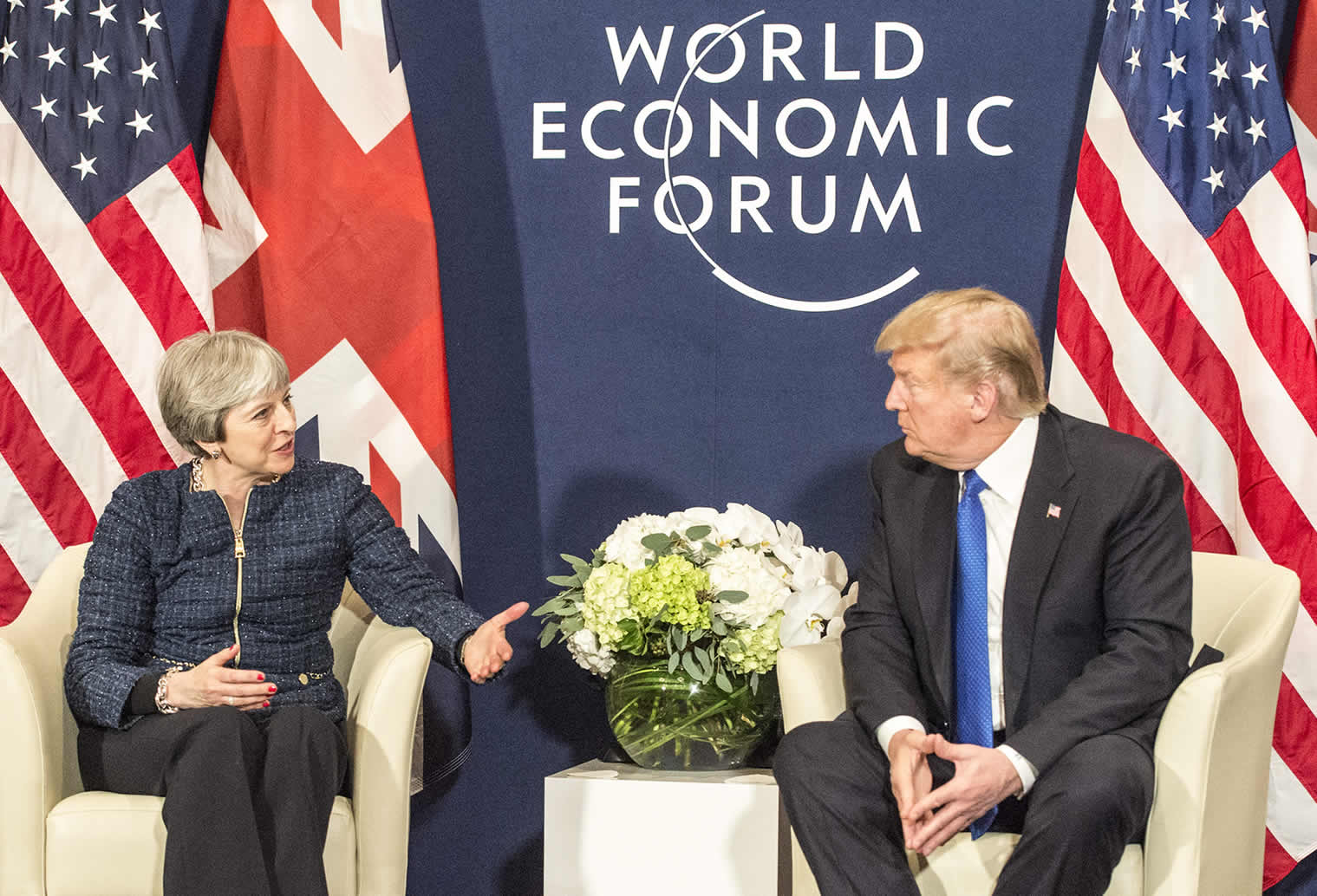Trump Weakens May's Hand

Above: File photograph of UK Prime Minister Theresa May and US President Donald Trump. Image © Lee Goddard / Number 10 Downing Street.
- Trump says Brexit deal might hinder future UK-US trade deal
- Intervention likely to weaken May’s hand
- Prime Minister's office says US and UK already laying groundwork for trade deal
- Pound "can get cheaper" say Citi
The British Pound trades on the backfoot Tuesday amidst an embeded anxiety relating to whether or not the EU and UK will have a Brexit agreement in place come March 2019.
Sterling is the worst-performing G10 currency of the day, recording its largest decline of +0.5% against the Australian Dollar right through to its narrowest, albeit still sizeable, decline of 0.3% against Switzerland's Franc. The headline Pound-to-Euro exchange rate is presently quoted at 1.1272 and the Pound-to-Dollar rate at 1.2736.
There is good reason for markets to be anxious following the announcement Monday that the UK parliament will vote on Theresa May's Brexit deal in the week of December 10; should the deal pass we believe the Pound could enjoy a strong relief rally as the prospect of a 'no deal' Brexit is finally eliminated.
However there remains little prospect of the deal passing parliament in its current form.
Interventions on Brexit by Global leaders remains unhelpful for the Prime Minister with U.S. President Donald Trump the latest to offer commentary that will only reinforce opposition to the Prime Minister's plans.
"Sounds like a great deal for the EU," Trump told reporters outside the Whitehouse when questioned on the deal May struck with the EU’s other 27 heads of state and government on Sunday.
"I think we have to take a look at, seriously, whether or not the UK is allowed to trade. Because, you know, right now, if you look at the deal, they may not be able to trade with us … I don’t think that the prime minister meant that. And, hopefully, she’ll be able to do something about that," adds the President.
Commentators suggest Trump’s intervention is likely to weaken May’s hand at a time when she is seeking to get the deal approved by parliament, where she faces resistance from 89 Conservative backbenchers who argue the deal does not secure sufficient freedom of action for the UK.
The Prime Minister's office has however released a communication in response to Trump's comments saying, "we have agreed with the EU is very clear that we will have an independent trade policy so that the UK can sign trade deals with countries around the world — including with the US. We have already been laying the groundwork for an ambitious agreement with the US through our joint working groups, which have met five times so far."
The ability to striking trade deals independent of the EU is a key test of any Brexit deal and May told parliament on Monday her deal would allow the UK to just that. However opponents remain wary that her deal has too many clauses that would allow the EU to remain control over UK customs policy; a view now shared by Trump.
The comments only add pressure on May to get further concessions from Europe.
More helpful timing for the PM.... https://t.co/volaAdt5Vo
— Laura Kuenssberg (@bbclaurak) November 26, 2018
The prospect of no deal being reached by March 2019 remains the key threat to Sterling going forward and we are told that the currency could become significantly "cheaper" as a result.
"Political uncertainty may cause significant downside risks. It seems likely that the draft UK-EU withdrawal agreement will be voted down by the “Meaningful Vote” in the House of Commons. Therefore, the probability of a market friendly transition arrangement are falling fast. The UK is facing completely unchartered waters on economic and political spectrum. What’s cheap can certainly get cheaper," says a note from Citibank.
In an appearance before the House of Commons on Monday May was reminded she does not have the backing of the majority of her party or the opposition to push through her Brexit deal.
She now has two weeks to win over MPs.
Parliamentarians were quick to pick up on comments by French President Macron over the weekend that France would not grant the UK a trade deal unless French fisherman were granted access to UK waters in a future fisheries deal.
The comments suggest other individual European nations will cherry-pick concessions from the UK now that their hands are strengthened by the Northern Ireland backstop - a default customs union that would be triggered in the event of no trade deal being struck during the next two years thereby keeping the UK in a permanent state of limbo.
We believe that only when the backstop clause is dropped, or ammended, will May find she has the backing of her party. The European Union have however indicated they will not be revisiting the issue.
"GBP pressure should persist and volatility remain high this week," says Joseph Capurso, a strategist with Commonwealth Bank of Australia. "The next major hurdle is to get the Brexit deal approved by the UK House of Commons, a vote provisionally scheduled for 10 December. However, it still looks like UK Prime Minister Theresa May will struggle to gather a majority to pass the Brexit deal in the UK House of Commons."
1 GBP buys 1.1294 EUR on the interbank market but high-street banks are offering exchange rates of between 1.10 and 1.1090 for international payments. Specialist currency providers are offering between 1.1180 and 1.1215.
1 GBP buys 1.2807 USD on the interbank market with high-street banks offering exchange rates of between 1.2460 and 1.2550. Specialist providers are offering in the region of 1.2692 and 1.2717 we believe.
